conservation
∞
The Howler Monkeys of Petén, Guatemala
Each year I co-teach a January-term class on tropical ecology in Guatemala and Belize.
One of my favorite experiences when I return to Guatemala is hearing the howler monkeys at night. Their voices travel for miles through the forest, it seems. My students are often alarmed by the noise, because the monkeys will approach silently and then begin to howl in the treetops overhead with voices that seem to belong to something much bigger than a mono aullador, as they are called in Spanish.
During one of my last trips I made this video. We were setting up camp in the Mayan Biosphere Reserve, or Biosfera Maya, en route to Tikal, when several troops of howlers began to sing nearby. We followed the voices to one of the nearest troops so we could get a closer look at these gentle beauties, our placid arboreal cousins. Enjoy the sound.
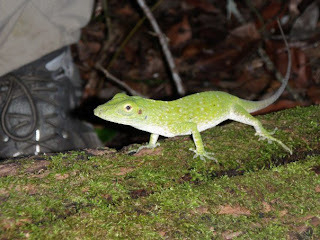 |
| One of the wonders of the Mayan Biosphere Reserve |
During one of my last trips I made this video. We were setting up camp in the Mayan Biosphere Reserve, or Biosfera Maya, en route to Tikal, when several troops of howlers began to sing nearby. We followed the voices to one of the nearest troops so we could get a closer look at these gentle beauties, our placid arboreal cousins. Enjoy the sound.
If you're interested in bringing your students to this fairly
well-preserved rainforest and arranging local guides, you might check
out the Asociación Bio-Itzá, an indigenous Mayan group dedicated to
preserving their forest, their ancestral knowledge, and their language.
They have a small rustic facility on their rainforest reserve and a
Spanish-language school for foreigners (with very reasonable prices) on the north shore of Lake Petén
Itzá, not far from the airport at Flores and from the beautiful ruins of
Tikal.
*****
(A friend tells me he extracted the sound from this video of mine and uploaded it to the wikipedia page on howler monkeys.)
∞
The Moral Issue Of Land
In my daily readings a while back I came upon this:
And this, written by Alan Paton. His younger Jarvis (in Cry, the Beloved Country) also writes prophetically about South Africa. What he says could have been written about any number of places, though:
The question I am pondering this morning: What do love and justice require of us when it comes to land ownership?
This question is made more poignant as our state legislature is considering eliminating perpetual conservation land easements. One argument against them is that it seems unreasonable to put limitations on future people. We may rightly ask: can we consider those people who do not yet exist - and who therefore may never exist - as factors or agents in our moral reasoning?
And yet every time we consume a non-renewable resource we are making an irrevocable decision about what the land will yield for perpetuity. Land easements may be one way to offset the effects of our other decisions, and they are at least reversible if the future proves them foolish.
Jarvis correctly diagnoses us: when we think about the future, frequently we are moved by fear. Isn't that why the prince Ezekiel spoke of was tempted not to give up his land?
I also find that when I think about the future, I am also motivated by love, and that love is perhaps my strongest, my most angelic impulse. I save, teach, build, conserve, and create for my children, and for others like them. I may not be able to give them a better world, but I do feel - I admit it is, at its base, a feeling - that I owe them at least as good a world as I received.
"[The prince] is to give his sons their inheritance out of his own property so that none of my people will be separated from his property." (Ezekiel 46.18)
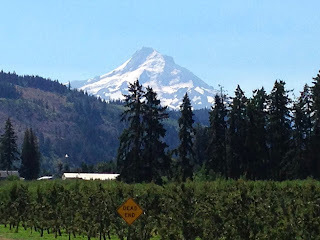 |
| Central Oregon |
And this, written by Alan Paton. His younger Jarvis (in Cry, the Beloved Country) also writes prophetically about South Africa. What he says could have been written about any number of places, though:
"It is true that we hoped to preserve the tribal system by a policy of segregation. That was permissible. But we never did it thoroughly or honestly. We set aside one-tenth of the land for four-fifths of the people. Thus we made it inevitable, and some say we did it knowingly, that labour would come to the towns. We are caught in the toils of our own selfishness....No one wishes to make its solution seem easy....But whether we be fearful or no, we shall never, because we are a Christian people, evade the moral issues."As a child I thought prophets were people who predicted the future, or who spoke things God wanted to say, like spokespeople. As I've grown older, my notion of prophets has expanded to mean those people who disrupt our quotidian secular and economic concerns in order to remind us that love and justice may and must constrain our actions. What could be more important than that?
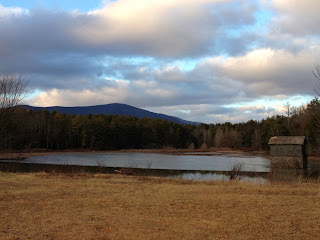 |
| Zena Reservoir and Overlook Mountain |
The question I am pondering this morning: What do love and justice require of us when it comes to land ownership?
This question is made more poignant as our state legislature is considering eliminating perpetual conservation land easements. One argument against them is that it seems unreasonable to put limitations on future people. We may rightly ask: can we consider those people who do not yet exist - and who therefore may never exist - as factors or agents in our moral reasoning?
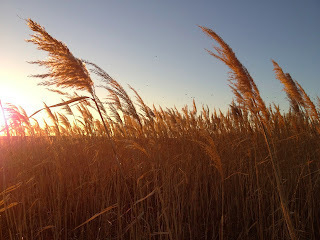 |
| Dakota prairie |
And yet every time we consume a non-renewable resource we are making an irrevocable decision about what the land will yield for perpetuity. Land easements may be one way to offset the effects of our other decisions, and they are at least reversible if the future proves them foolish.
Jarvis correctly diagnoses us: when we think about the future, frequently we are moved by fear. Isn't that why the prince Ezekiel spoke of was tempted not to give up his land?
I also find that when I think about the future, I am also motivated by love, and that love is perhaps my strongest, my most angelic impulse. I save, teach, build, conserve, and create for my children, and for others like them. I may not be able to give them a better world, but I do feel - I admit it is, at its base, a feeling - that I owe them at least as good a world as I received.
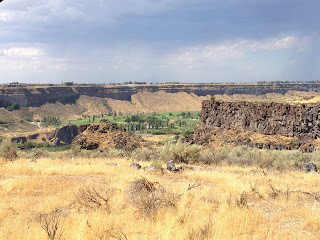 |
| Twin Falls, Idaho |